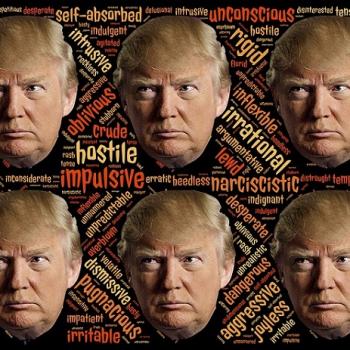 |
|
Plenty to go around
|
On May 5th, British Home Secretary Jacqui Smith named 16 people who have been banned from entering the UK. According to Smith, she made the list public in order to demonstrate the type of behavior Britain found unacceptable according to its “values” and “standards”. The list includes anti-gay protesters, hate preachers, Muslim extremists, and a right-wing American talk show host.
The UK’s banning individuals because of their viewpoints comes as no surprise, given its recent refusal to allow Geert Wilders – the infamous filmmaker responsible for “Fitna” – to enter the UK. The opening scenes of “Fitna” show a copy of the Qur’an followed by footage of 9/11 and the London and Madrid bombings of 2005 and 2004, respectively. Wilders had initially been invited to a screening of his film at the British Parliament; the invitation was later rescinded on the premise that Wilders – who has said his film has no purpose other than to offend – was a threat to public security.
Britain has been worried about its safety from internal menaces as well. On May 6th, Abu Izzadeen, a radical Muslim preacher, was released from prison after a Court of Appeals judge reduced his sentence and let him out a year early. Izzadeen had been jailed for calling for the beheading of any Muslim in the British army.
And in the backdrop of all this is the recent passage of the UN Defamation Resolution, a non-binding instrument that forbids the defamation of religions. Critics of the Resolution consider it an international cover for domestic anti-blasphemy laws in resolution-supporting countries like Pakistan and Egypt, where Muslim dissenters and followers of minority religions are sentenced to death and life imprisonment for expressing their beliefs.
Although the UK is not a supporter of the Defamation Resolution, its use of visa controls to punish those who have expressed “extreme” views is based on the same communal theory of rights as the Resolution. The idea behind both is that individual rights – such as the right to free speech – should be curtailed for the sake of public sentiment. As Jacqui Smith stated, the list of people banned from the US was supposed to represent what the UK stands for, and what it considers a threat to its values. Extremists and hate preachers were banned for the sake of social cohesion.
Two of the people banned were extreme right-wing US radio talk show host, Michael Savage, and Muslim preacher, Abdul Alim Musa. Among his outrageous statements, Savage has claimed that autism is not a real disease but is instead “’a racket’ designed to get disability payments for ‘poorer families who have found a new way to be parasites on the government.’” Savage is also known for his confrontation with the Council on American-Islamic Relations (CAIR), who quoted him as saying that Muslims need to be deported and “that adherents of Islam would do well to ‘take your religion and shove it up your behind’ because ‘I’m sick of you.’” He was banned from the UK because of his “’engaging in unacceptable behavior by seeking to provoke others to serious criminal acts and fostering hatred which might lead to inter-community violence.’”
As for Musa, he was banned because of his “fomenting and glorifying terrorist violence in furtherance of his particular beliefs and seeking to provoke others to terrorist acts.” Musa’s statements about Jews include, among others, “Who ran the slave trade…who funded [it]? You’ll study and you will find out: the Jews…It was the Jewish bankers…in Vienna, with pockets full of money, funding and insuring, that’s who did it…. you can’t tell us about no holocaust. Between the African Americans and the Native Americans, everybody else’s stuff was small potatoes.” During a July 1999 rally, Musa displayed a cashier’s check made out to “Hamas, Palestine” in order to protest the U.S. declaration that Hamas is a terrorist organization. And at a 2001 event at UCLA titled, “Shaping Our Perspective: Our Role in a Changing World,” Musa discussed the Muslim role in the inevitable downfall of the U.S.
Despite the highly offensive nature of both Savage’s and Musa’s statements, the UK’s ban on their entry and that of others like them is problematic for a number of reasons. For one, the ban has contributed significantly to these individuals’ celebrity status. Savage and Musa have each milked the incident to increase their following, making themselves both the victims of a vast injustice, and heroes who stand in defiance of the ban. Savage, for example, is considering suing the British government for defamation.
More problematic than this is the larger issue of the UK using its borders to censor speech. According to Smith, the ban is aimed at those “likely” or who have “potential” to cause violence or “inter-community tension”. Its breadth and vagueness provide little guidance on where the government draws the line between language that is too “extreme” and language that is not. Aside from the fact that such viewpoint discrimination is in and of itself problematic, the result of such vagueness is the potential chilling of a broad range of speech.
Which raises the issue – what made the speech of those banned so extreme that they are considered legitimately banned from the country? How should we determine which speech should be protected? Considering the UK’s ban in the context of the UN Defamation Resolution, a brainchild of the Organization of Islamic Countries (OIC), the question for these Muslim countries, and for us, is: should governments allow offensive language or not?
The American model
The free speech standard in American jurisprudence is perhaps most instructive when it comes to answering these questions. The standard is quite broad. In fact, all speech, except that which falls in certain narrowly defined categories, is permissible. For the purposes of this article, the most relevant category of such unprotected speech is that of “fighting words”. Fighting words are those that incite hatred or violence from their target or whose very utterances create a verbal or physical confrontation.
The U.S. Supreme Court established the fighting words doctrine in its 1942 case, Chaplinsky v. New Hampshire. The case involved Walter Chaplinsky, who verbally and publicly assaulted a town marshal with such epithets as, “You are a God-damned racketeer” and “a damned Fascist”. Chaplinsky was arrested under a statute that prohibited anyone from addressing another person with “any offensive, derisive or annoying word … who is lawfully in any street or public place…or … call[ing] him by an offensive or derisive name.”
The U.S. Supreme Court held that Chaplinsky’s words constituted “fighting words”. The Court stated that fighting words have no social or intellectual value and in their very utterance inflict injury or tend to incite an immediate breach of the peace. In a unanimous decision, the Court thus held that fighting words are not constitutionally protected.
American free speech law has of course evolved since Chaplinsky, but it remains true that only face-to-face words, direct personal insults, or “epithets likely to provoke the average person to retaliation and thereby cause a breach of the peace” constitute fighting words. Mere offensiveness does not strip speech of its constitutional protection; to lose protection, the words must present an “actual threat of immediate violence”. In more recent cases, the Court has explained that fighting words do not express ideas but are merely a mode of communicating other ideas. It is essentially that mode of delivery that the Court has granted government the right to regulate.
Acknowledging that the U.S. has itself violated the spirit of its free speech jurisprudence – the strong belief in the free marketplace of ideas – in banning scholars like Tariq Ramadan from entering the country, this jurisprudence sets the correct standard. It limits speech that, because of its mode of delivery, is directly and immediately violent while allowing the broader scope of offensive language. Any other standard usurps the individual right to free speech.
Consider, for example, the UN Defamation Resolution’s proposal that States penalize defamation of religions. Not only does the Resolution protect religions and ideologies instead of individuals, but it also opens up the vast space of subjective interpretations of speech. That is, one can be penalized for defaming a religion if a listener was offended – whether there was intent to offend is irrelevant. The slippery slope consequences of such a standard are obvious.
Moreover, how would we account for dissent? Those who disagree with us – for example, those who criticize our religion or co-religionists who have different interpretations – can offend us with their dissent. Is that enough to punish them for their speech?
Similarly, on the UK’s list of 16, half of those named are Muslim radicals, and the remaining individuals range from neo-Nazis to anti-gay protesters to talk show host, Savage. Each of these individuals poses a different level of threat, with many – like Savage and Musa – being merely offensive. Given the variability of speech involved, there is no reasoned basis to ban these individuals and not others whose language is of milder offense. Application of a standard akin to the “fighting words” doctrine could help define the limits and protect free speech rights in the broadest form possible.
Asma T. Uddin is an attorney and Editor-in-Chief of Altmuslimah











